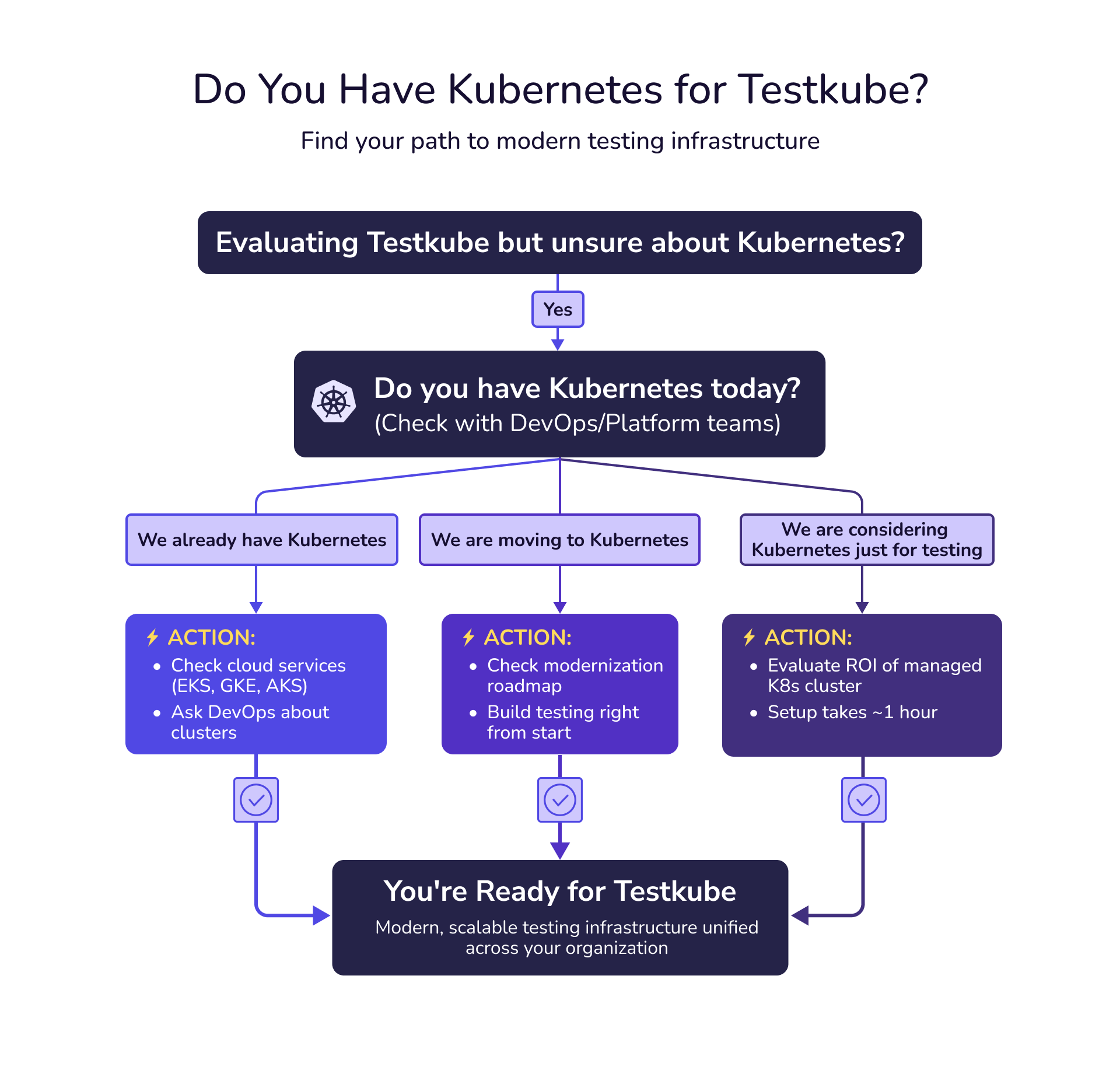

Table of Contents
Try Testkube free. No setup needed.


Table of Contents
Executive Summary
Development is moving faster than ever with AI and distributed systems, but your testing infrastructure is struggling to keep up. Testkube solves this by running tests at scale on Kubernetes. But what if your team doesn't have Kubernetes yet?
If you’re worried you can't use Testkube because you don't have Kubernetes, you're not the only one. A lot of teams we meet think the same, but usually it's just a misunderstanding about what's already running in their environment.
If you're in QA, DevOps, or platform engineering and not sure if your infrastructure is ready for Kubernetes-based testing, this is for you. Not having Kubernetes almost never ends up being the real blocker. Most teams fall into one of three buckets, and each has a clear next step.
Why Kubernetes matters for testing
Kubernetes isn't just a deployment technology. It's a way to unify how applications and tests run across environments and infrastructure. Without Kubernetes, teams can waste hours debugging differences in test results between development, staging, and production environments. With it, your tests run in the same infrastructure no matter how many environments you have, giving you consistent test results, faster feedback loops, and less time fighting flaky infrastructure. It's the foundation that makes continuous, scalable testing possible.

Scenario 1: You probably already have Kubernetes
Let's start with the most common situation: you actually do have Kubernetes, you just don't realize it yet.
Finding your Kubernetes
In most organizations, development, QA, DevOps, and platform engineering teams operate independently. What typically happens is that Kubernetes is running somewhere in your infrastructure, but the testing team simply doesn't know about it.
Where it often hides:
- Managed cloud services. If you're using AWS (EKS), Google Cloud (GKE), or Azure (AKS), there's a good chance Kubernetes is already provisioned.
- Platform teams. DevOps or platform engineering groups may have clusters that other teams can leverage.
- Microservices Architecture for your applications. If your organization has adopted microservices, Kubernetes is likely orchestrating them (or on the roadmap..).
What to do
Before deciding Testkube isn't for you, have a conversation with your DevOps or platform engineering team. Ask them:
- Do we have any Kubernetes clusters running?
- Are we using managed Kubernetes services in our cloud infrastructure?
- Could the testing team access an existing cluster?
You might be surprised by what you discover. We've seen countless teams realize they had Kubernetes resources available all along. They just needed to ask the right questions.
Scenario 2: You're moving to Kubernetes
If your organization is undergoing digital transformation, evaluating microservices, or planning cloud modernization, Kubernetes is probably in your future.
Testing infrastructure as a catalyst
Some of our best customer relationships started with organisations who were planning to adopt Kubernetes and wanted to build their testing infrastructure correctly from the start.
Getting your testing foundation right before or during a Kubernetes migration offers several advantages:
- Prevents technical debt. No need to rebuild your testing infrastructure later.
- Smoother transition. Your testing team becomes Kubernetes-savvy alongside development.
- Immediate ROI. As soon as your K8s clusters go live, your testing infrastructure is ready.
- Reduced risk. Proper testing infrastructure reduces the risk of cloud-native migrations.
Questions to ask yourself
- Is container adoption or cloud modernization on our roadmap for this year?
- Are you evaluating microservices or cloud-native architectures?
- Is there a DevOps transformation initiative underway?
If you answered yes to any of these questions, Testkube might be exactly what you need, not despite your Kubernetes plans, but because of them.
The teams that succeed with Testkube during K8s adoption are those who:
- Identify their Kubernetes adoption timeline.
- Connect testing transformation with the broader modernization initiative.
- Build relationships with the teams driving Kubernetes adoption.
- Position testing infrastructure as a strategic part of the transformation.
Even if Kubernetes is six to twelve months away, starting the conversation now means you'll be ready when the time comes.
Several of our customers started in this exact position, unsure whether Kubernetes was available internally. Once they discovered existing clusters or adopted lightweight managed services, they were able to modernize their testing infrastructure in weeks instead of months.
Scenario 3: You should consider Kubernetes just for testing
What if you're not using Kubernetes today and don't have immediate plans to adopt it organization-wide? Does that mean Testkube isn't for you?
Well, not necessarily.
The case for Kubernetes-for-Testing
If you're serious about transforming how your organization does testing, the value Testkube delivers might justify adopting Kubernetes specifically for your testing infrastructure.
Why testing teams are adopting Kubernetes for Testkube even when dev teams haven't:
- Unified Test Orchestration: Run any testing tool from a single platform. No more figuring out how to run Selenium, Playwright, JMeter, Postman, K6, Cypress, and any other tool in your testing delivery pipelines.
- Scale at Kubernetes Speed: Be it parallelised performance-testing with k6 or JMeter, sharded E2E tests with Playwright or Cypress, or multi-browser testing with Selenium - Testkube has you covered - thanks to Kubernetes.
- Single Pane of Glass: Get a unified view of all testing activities across your entire organization. No more hunting through different dashboards and logs.
- Test Observability: Gain insights into test performance, flakiness, and reliability that you simply cannot get with traditional testing infrastructure.
- Ready for Cloud-Native: When you do decide to modernize, your testing infrastructure is already there.
"But isn't Kubernetes complicated?"
This is a big concern, and it's understandable. Kubernetes has a reputation for complexity. However, when you're only running Kubernetes for Testkube purposes, the story changes: the actual Testkube component that you need to host in your Kubernetes infrastructure is a lightweight Testkube Agent which is what is actually running your tests. The Testkube Control Plane can be hosted by us - making a low-touch Kubernetes installation much more manageable, especially considering that:
- Managed services make it easy. EKS (Elastic Kubernetes Service), GKE (Google Kubernetes Engine), and AKS (Azure Kubernetes Service) are essentially point-and-click.
- Isolated from production. A standalone cluster for testing carries minimal risk.
- Minimal maintenance. Modern managed Kubernetes requires less overhead than you think.
- Fast setup. You can have a small cluster running in under an hour.
- Built-in dynamic scalability. Kubernetes automatically adjusts resources based on demand.
Think of it this way: if Testkube is going to fundamentally improve your testing workflow (and it will), spending an hour to set up a managed Kubernetes cluster is a small investment for significant returns.
Getting help
You don't have to figure this out alone. From proof of concept to full rollout, Testkube's team can help you assess your environment, connect existing tools, and operationalize Kubernetes-based testing at your own pace.
Whether you already have Kubernetes, are preparing to migrate, or are exploring it for the first time, there's a clear path to modern, scalable testing with Testkube.
The bottom line
"We don't have Kubernetes" doesn't mean "We can't use Testkube." It means you need to ask a few more questions:
- Do we actually have Kubernetes somewhere? (Check with DevOps or platform teams.)
- Is Kubernetes in our future? (Check your modernization roadmap.)
- Is the value of Testkube worth a Kubernetes cluster for testing? (Consider the ROI.)
The testing landscape is changing rapidly. Teams that cling to legacy infrastructure while their competitors adopt cloud-native testing platforms are falling behind. The question isn't really "Do we have Kubernetes?" It's "What's the best path forward for our testing infrastructure?"
For most teams, that path leads to Testkube. Whether you already have Kubernetes, you're planning to adopt it, or you're willing to spin up a small cluster for testing, there's a way forward.
Ready to explore your options?
If you're still not sure whether Testkube makes sense for your situation, we'd love to talk. Our team can help you:
- Discover existing Kubernetes resources in your organization.
- Understand your modernization roadmap and how testing fits in.
- Evaluate the ROI of adopting Kubernetes specifically for testing.
- Connect you with resources and partners who can help.
The last thing you want is to skip a platform that could transform your testing, all because of a misunderstanding about what infrastructure you actually need. Don't miss out on better testing infrastructure simply because "we don't have Kubernetes."


About Testkube
Testkube is a cloud-native continuous testing platform for Kubernetes. It runs tests directly in your clusters, works with any CI/CD system, and supports every testing tool your team uses. By removing CI/CD bottlenecks, Testkube helps teams ship faster with confidence.
Explore the sandbox to see Testkube in action.








